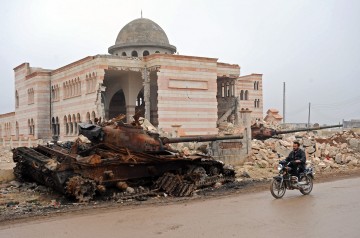
Fresno State students and faculty responded to the mounting evidence that the United States may use military force against Bashar al-Assad’s regime in Syria after allegations that chemical weapons were used in the country’s civil war.
Chemical weapons, which are banned under international law, were considered a “red line” by President Barack Obama. If it was determined that Syria used chemical weapons, Obama said that would cross a line that demanded an international response.
The United Nations estimates about 100,000 people have died since the war began in March 2011.
White House spokesman Jay Carney spoke to reporters in a press conference Tuesday:
“Allowing the use of chemical weapons on a significant scale to take place without a response would present a significant challenge to or threat to the United States’ national security,” he said.
Carney said that before a military option is implemented, a U.S. intelligence report will be made public about the Aug. 21 incident near Damascus that reportedly killed and wounded thousands.
In response to the alleged chemical attack, U.S. warships armed with cruise missiles have been moved into the region.
Before missiles are launched, however, Fresno State students and faculty questioned the necessity of becoming militarily involved.
Dr. Jeffrey Cummins, a professor in the political science department, said that because the U.S. is not directly connected to the conflict, it should not get involved.
“I think there are other options,” Cummins said. “We could provide stronger aid to the rebels, but they aren’t necessarily our friends, either.”
The murky landscape of the conflict is why caution must rule over everything else, said Dr. Lori Clune in the history department.
“Are we 100 percent sure of who is doing what?” she said. “Going in guns blazing makes me hesitant. The time to pause is now. This is when reasonable thought has to happen. Yes, the thought of losing more lives to chemical weapons while we gather information is horrifying. But making the wrong decision is worse.”
Fresno State student Sumaya Attia, said the wrong decision was waiting this long.
“The U.S. should have been involved when the civil war started,” Attia said. “I think the U.S. avoided the conflict for political reasons, but they ignored humanitarian needs.”
However, Attia said that military intervention was never the best option. More political pressure, in her opinion, needed to be used against supporters of Assad’s regime before the war escalated beyond control.
War weariness amongst the American population and even the military should also be considered, Clune said.
“I worry about the effectiveness of our military,” Clune said. “We’ve asked them to engage in far more conflicts than they can maintain and we risk overextension.”
She added that the prospect of getting involved in the Middle East again given recent history is a tough decision to sell to the public.
“I think recent history would indicate that a really big coalition of willing and eager [allies] would be necessary,” Clune said. “We are not in a position as a country to unilaterally go in. If we cannot convince allies to go in, then we need to reconsider.”
Fresno State student Krista Brown, a sergeant in the Army National Guard who served in Iraq for 15 months from 2009 through 2010, agreed that, if chemical weapons were used, an international response is needed””not just from the U.S.
“I think using chemical weapons is a red line,” Brown said referring to Obama’s warning to Syria about using chemical weapons. “It’s time for the U.N. to step in with troops. It is the right thing to do at that point. But, even when the U.N. steps in with other countries involved, it’s still mostly U.S. troops. This needs to be a true international reaction.”
In Fresno State student Qaboos Muthana’s opinion, a humanitarian effort to help refugees while also cutting off the supplies of weapons into Syria is the best international reaction.
“This is going to blow back on the U.S.,” Muthana said about using military force. “This is a Syrian conflict. People will blame the United States no matter what. It always happens.”
The executive branch shouldn’t make such a big decision alone, Cummins said. Congress should be involved.
“I am somewhat bothered that the president doesn’t feel the need to get congressional approval,” Cummins said. “He’s far from the first president to do that, but there needs to be congressional consent.”
Clune said that Congress must do its job as representatives for the people and demand a plan.
“If we are not really clear about what’s happening, what we want to get done, and can’t convince the American people””it forces the formulation of a policy that is doable and can be explained,” Clune said. “The American people can have a say. If Congress says no, there is a check against a conflict dragging on.”





